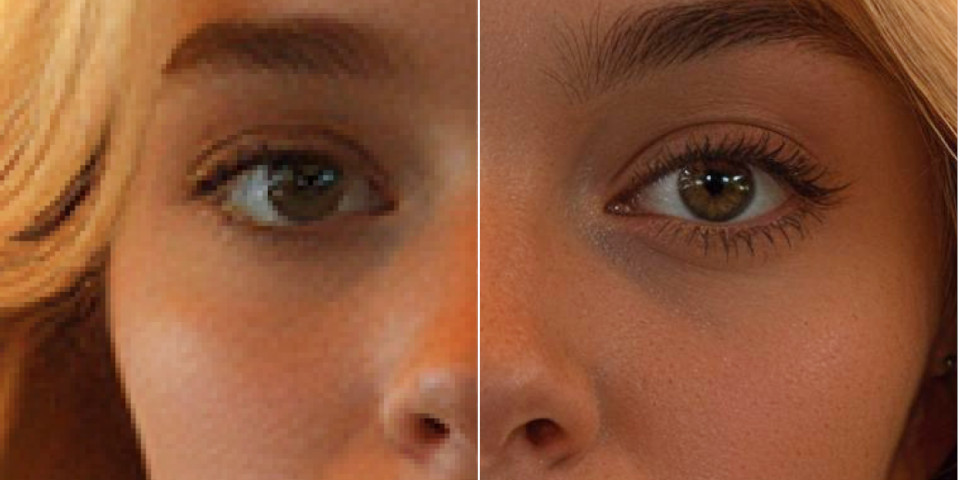
![]()
Gigapixel 8’s new Redefine model uses generative AI to fill in missing details in images.
Originally posted on 28 October 2024. Scroll down for details of the Gigapixel 8.2 update.
Topaz Labs has released Gigapixel 8, the latest major version of its AI-trained software for up-resing photos or rendered images without softening them or introducing noise.
Version 8.0 adds a new generative AI-based Redefine model for sharpening and stylizing images, and updates the software’s Face Recovery model.
It is also now possible to process images in the cloud, as well as on your local machine, with cloud processing charged on a credit basis.
Machine-learning-trained tool enlarges images without sacrificing detail
Gigapixel is designed to enlarge digital images while preserving their sharpness, using machine learning techniques to fill in the missing details.
Its algorithms are trained using a data set of “millions of images”, with Topaz Labs claiming that it can enlarge images up to 16x before image quality starts to drop visibly.
Although it’s marketed primarily at photographers, it can also be used on rendered imagery, and has had a dedicated AI mode for CG images since version 5.3.
As well as upscaling low-res renders to generate high-res images more quickly, users can remove noise from renders by upscaling them, then reducing them to their original size.
![]()
Text prompts can be used to guide the output of Gigapixel’s new generative AI-based Redefine model, particularly when using it at high Creativity settings.
Gigapixel 8.0: new generative AI-based Redefine model
Topaz Labs describes Gigapixel 8.0 as the “first upscaler using generative AI models to create high-quality photorealistic results”.
The software’s new Redefine model uses generative AI to fill in missing detail when upscaling images to very high resolutions, or repairing damaged images.
It is also “surprisingly good at denoising and sharpening in some scenarios”.
The model comes with a Creativity setting, which determines to what extent the image is stylized: low values result in realistic sharpening, while higher values produce progressively more and more stylized results.
For high Creativity settings, users can also enter text prompts to guide the content of the AI details generated, in a similar way to a conventional generative AI tool.
The Redefine model currently runs on the GPU, and there are some known issues with AMD GPUs and on macOS: you can find more details in the release notes.
Updates to Face Recovery
Gigapixel’s existing Face Recovery model has been updated, with the Gen 2 model improving performance when upscaling faces seen in profile.
Gen 2 also results in “cleaner teeth and eyeglasses”, and performs better when recovering “obscure faces with little-to-no facial attributes”.
Option to render images in the cloud, as well as on a local machine
The other major change in Gigapixel 8 is the option to process images in the cloud as well as on your local machine.
Cloud rendering is available when using the generative AI models: both Redefine and Recover, which was introduced in Gigapixel 7.1 for upscaling very low-res images.
The service is priced on a credit basis, with cost depending on image size – outputting larger images costs more – and the AI model used.
Updated 10 February 2025: Topaz Labs has released Gigapixel 8.2.
The update adds the option to upscale images based on their longest side, making it possible to batch process images with varying aspect ratios.
It is also now possible to batch upload and batch process images in the cloud, as shown above.
Topaz Labs has also improved performance of the generative AI-based Redefine model, particularly on macOS, although Mac users are still reporting issues in the release thread.
The previous update, Gigapixel 8.1, added the option to order physical prints of images from within Gigapixel, via a partnership with photo printing firm WhiteWall.
Price and system requirements
Gigapixel is available as a standalone application for Windows 10+ and macOS 11.0+; and as a plugin for Photoshop and Lightroom Classic.
The software is OpenGL-based, and supports AMD, Apple Silicon, Intel and NVIDIA GPUs.
New licences of the standard edition cost $99. The new Gigapixel Pro edition for studios is subscription only and costs $499/year.
Cloud render credits cost $5 for 20 credits. Credit subscriptions start at $9.99/month for 80 credits per month.
Read a full list of new features in Gigapixel 8.0 to 8.2 in the online release notes
Have your say on this story by following CG Channel on Facebook, Instagram and X (formerly Twitter). As well as being able to comment on stories, followers of our social media accounts can see videos we don’t post on the site itself, including making-ofs for the latest VFX movies, animations, games cinematics and motion graphics projects.






